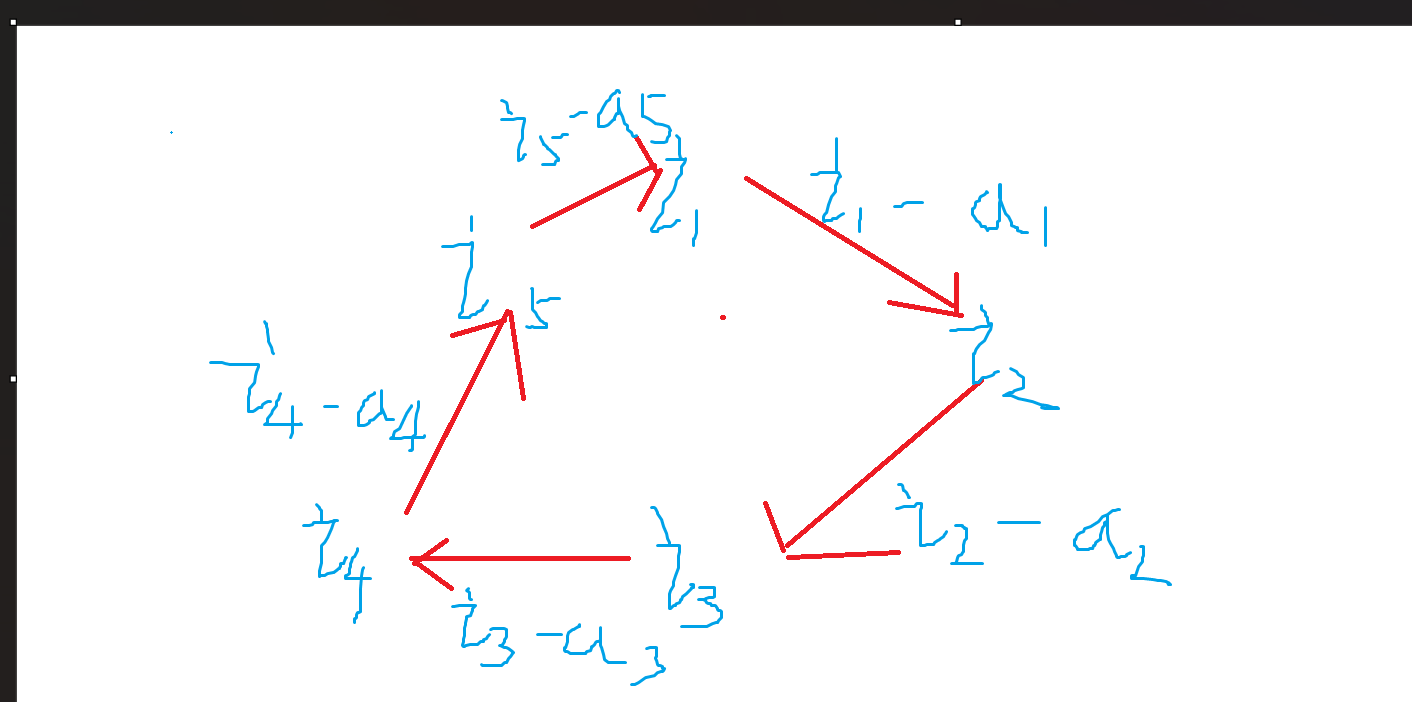题目链接:洛谷 或者 CF
比较朴素的题,首先观察题目条件:
\[ i-n \le a_i \le i-1 \Rightarrow 1 \le i-a_i \le n \text{,所以易知 } i-a_i \text{ 必定是某一点}
\]
考虑构造题目所说
\[\sum_{i=x_1}^{x_{t}} a_{i}=0 \text{,x即为所构造的集合元素下标}
\]
题目条件与 \(i-a_i\) 有关,考虑变形成这个形式:
\[\sum_{i=x_1}^{x_t}(i-a_i)=\sum_{i=x_1}^{x_t} i-\sum_{i=x_1}^{x_t}a_i=\sum_{i=x_1}^{x_t}i
\]
所以我们需要构造的集合满足以上条件即可了。考虑初识的时候把每个点 \(i\) 当做一个独立的图,那么就是有 \(n\) 个图。根据题目所说的 \(1 \sim n\) 范围,容易想到,我们将 \(i\) 与 \(i-a_i\) 连一条边,等价于 \(i\) 与其他图或者自身连了一条边。一共 \(n\) 个点 \(n\) 条边,容易想到这最终是一个基环树内向森林。那么考虑比较特殊的环上的点具有的性质。
本题当中,容易观察到有:

环上的情况如图所示,假设一共有 \(cnt\) 个点,那么必有 \(i_j-a_j =i_{(i+1 \bmod cnt )+1}\)
考虑此时此刻计算下来显然有:
\[\sum i = \sum i-a_i
\]
那么这个环即为所求,基本的建图以后,基环树找环即可。
参照代码
#include <bits/stdc++.h>
//#pragma GCC optimize("Ofast,unroll-loops")
// #define isPbdsFile
#ifdef isPbdsFile
#include <bits/extc++.h>
#else
#include <ext/pb_ds/priority_queue.hpp>
#include <ext/pb_ds/hash_policy.hpp>
#include <ext/pb_ds/tree_policy.hpp>
#include <ext/pb_ds/trie_policy.hpp>
#include <ext/pb_ds/tag_and_trait.hpp>
#include <ext/pb_ds/hash_policy.hpp>
#include <ext/pb_ds/list_update_policy.hpp>
#include <ext/pb_ds/assoc_container.hpp>
#include <ext/pb_ds/exception.hpp>
#include <ext/rope>
#endif
using namespace std;
using namespace __gnu_cxx;
using namespace __gnu_pbds;
typedef long long ll;
typedef long double ld;
typedef pair<int, int> pii;
typedef pair<ll, ll> pll;
typedef tuple<int, int, int> tii;
typedef tuple<ll, ll, ll> tll;
typedef unsigned int ui;
typedef unsigned long long ull;
typedef __int128 i128;
#define hash1 unordered_map
#define hash2 gp_hash_table
#define hash3 cc_hash_table
#define stdHeap std::priority_queue
#define pbdsHeap __gnu_pbds::priority_queue
#define sortArr(a, n) sort(a+1,a+n+1)
#define all(v) v.begin(),v.end()
#define yes cout<<"YES"
#define no cout<<"NO"
#define Spider ios_base::sync_with_stdio(false);cin.tie(nullptr);cout.tie(nullptr);
#define MyFile freopen("..\\input.txt", "r", stdin),freopen("..\\output.txt", "w", stdout);
#define forn(i, a, b) for(int i = a; i <= b; i++)
#define forv(i, a, b) for(int i=a;i>=b;i--)
#define ls(x) (x<<1)
#define rs(x) (x<<1|1)
#define endl '\n'
//用于Miller-Rabin
[[maybe_unused]] static int Prime_Number[13] = {0, 2, 3, 5, 7, 11, 13, 17, 19, 23, 29, 31, 37};
template <typename T>
int disc(T* a, int n)
{
return unique(a + 1, a + n + 1) - (a + 1);
}
template <typename T>
T lowBit(T x)
{
return x & -x;
}
template <typename T>
T Rand(T l, T r)
{
static mt19937 Rand(time(nullptr));
uniform_int_distribution<T> dis(l, r);
return dis(Rand);
}
template <typename T1, typename T2>
T1 modt(T1 a, T2 b)
{
return (a % b + b) % b;
}
template <typename T1, typename T2, typename T3>
T1 qPow(T1 a, T2 b, T3 c)
{
a %= c;
T1 ans = 1;
for (; b; b >>= 1, (a *= a) %= c)if (b & 1)(ans *= a) %= c;
return modt(ans, c);
}
template <typename T>
void read(T& x)
{
x = 0;
T sign = 1;
char ch = getchar();
while (!isdigit(ch))
{
if (ch == '-')sign = -1;
ch = getchar();
}
while (isdigit(ch))
{
x = (x << 3) + (x << 1) + (ch ^ 48);
ch = getchar();
}
x *= sign;
}
template <typename T, typename... U>
void read(T& x, U&... y)
{
read(x);
read(y...);
}
template <typename T>
void write(T x)
{
if (typeid(x) == typeid(char))return;
if (x < 0)x = -x, putchar('-');
if (x > 9)write(x / 10);
putchar(x % 10 ^ 48);
}
template <typename C, typename T, typename... U>
void write(C c, T x, U... y)
{
write(x), putchar(c);
write(c, y...);
}
template <typename T11, typename T22, typename T33>
struct T3
{
T11 one;
T22 tow;
T33 three;
bool operator<(const T3 other) const
{
if (one == other.one)
{
if (tow == other.tow)return three < other.three;
return tow < other.tow;
}
return one < other.one;
}
T3() { one = tow = three = 0; }
T3(T11 one, T22 tow, T33 three) : one(one), tow(tow), three(three)
{
}
};
template <typename T1, typename T2>
void uMax(T1& x, T2 y)
{
if (x < y)x = y;
}
template <typename T1, typename T2>
void uMin(T1& x, T2 y)
{
if (x > y)x = y;
}
constexpr int N = 1e6 + 10;
int n;
int a[N];
vector<int> child[N];
int loop[N], in[N], cnt;
bool vis[N];
inline void solve()
{
cin >> n;
forn(i, 1, n)child[i].clear(), in[i] = 0, vis[i] = false;
cnt = 0;
forn(i, 1, n)cin >> a[i], child[i].push_back(i - a[i]), in[i - a[i]]++;
queue<int> q;
forn(i, 1, n)if (!in[i])q.push(i);
while (!q.empty())
{
auto curr = q.front();
q.pop();
vis[curr] = true;
for (const auto nxt : child[curr])if (--in[nxt] == 0)q.push(nxt);
}
forn(i, 1, n)if (!vis[i])loop[++cnt] = i;
cout << cnt << endl;
forn(i, 1, cnt)cout << loop[i] << " ";
cout << endl;
}
signed int main()
{
Spider
//------------------------------------------------------
int test = 1;
// read(test);
cin >> test;
forn(i, 1, test)solve();
// while (cin >> n, n)solve();
// while (cin >> test)solve();
}